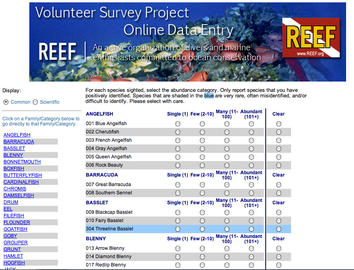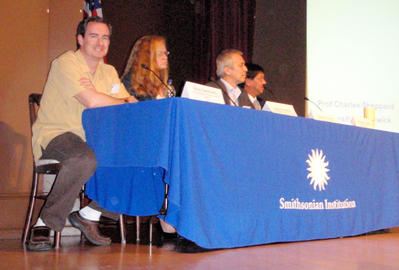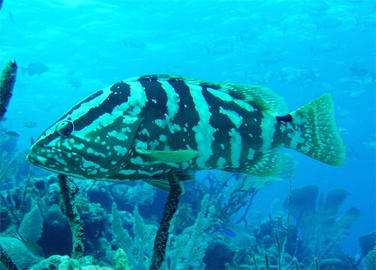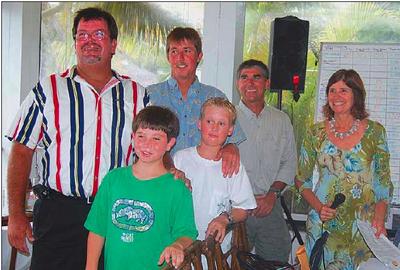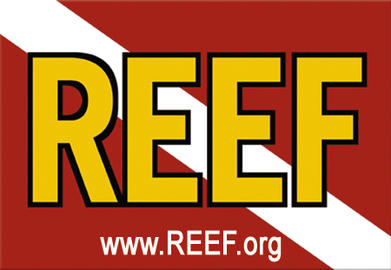On Saturday morning, June 20, SCUBA divers will converge on Coral Street Cove, a popular dive site in Pacific Grove, to collect marine life population information on the nearshore rocky reefs. The surveys are part of two citizen science programs that train volunteer recreational SCUBA divers and snorkelers to conduct field surveys - REEF (Reef Environmental Education Foundation, www.reef.org) and Reef Check (www.reefcheck.org).
We hope you enjoy this special edition of REEF-in-Brief, in honor of World Oceans Day, which was celebrated worldwide yesterday. First proposed in 1992—and unofficially celebrated since—World Oceans Day was declared by the United Nations to be recognized on June 8th every year starting with 2009. REEF's commitment to understanding and conserving the world oceans is reflected in our goal to protecting marine life through education, service, and research using volunteer citizen scientists. In this issue, we announce the launch of the newest Online Data Entry interface.
We are excited to announce the launch of Online Data Entry 2.0. The new version includes several upgrades and now encompasses all of REEF's project regions. At long last, our REEF surveyors in the Tropical Eastern Pacific region (Baja Mexico - Galapagos Islands) and the Northeast US & Canada (Virginia - Newfoundland) are able to submit their survey data online. In addition, based on feedback from our members, the interface to add unlisted species has been greatly improved.
REEF's Grouper Moon Project Featured as "Success Story in Marine Conservation" REEF's research program focused on studying one of the last remaining large spawning aggregations of Nassau grouper in the Cayman Islands, the Grouper Moon Project, was included as one of 26 stories of good news in the typically grim news of marine conservation efforts. Dr. Brice Semmens, Grouper Moon Project lead scientist, presented results from the collaborative research efforts during the Beyond the Obituaries: Success Stories in Ocean Conservation symposium organized by Drs.
Data collected as part of the REEF Volunteer Survey Project were the basis of a recent publication evaluating the effect of human population size on coral reef fish populations. The sweeping study, conducted by researcher Dr. Chris Stallings of Florida State University Coastal and Marine Laboratory, revealed that sharks, barracuda and other large predatory fishes disappear on Caribbean coral reefs as human populations rise, endangering the region’s marine food web and ultimately its reefs and fisheries.
The first Bahamas Lionfish Derby, held on June 6 at the Green Turtle Club in Abaco, was a great success on many fronts. This test case for the Bahamas government was the first to allow (by special permit) the use of compressed air and spearing to remove lionfish in a derby type event. Organized by Abaco and Palm Beach resident Bobbie Lindsay and REEF, the one-day event drew 26 registered teams and brought in 1, 408 lionfish. Over $5,000 in prize money was awarded including $2,000 for the most fish by any team – 289 by team White Roach from Abaco.
This was a predecision document prepared by NOAA’s Fisheries Service to evaluate the population status of five species of rockfish in the Puget Sound. REEF data were one of several datasets that were used by the fisheries scientists to make the evaluation. Based on the analyses, NOAA Fisheries proposed to list three populations of rockfish in Puget Sound and the Strait of Georgia for protection under the Endangered Species Act. The Georgia Basin populations of two of the rockfish species – canary and yelloweye – are proposed for “threatened” status.
Understanding the current status of predatory fish communities, and the effects fishing has on them, is vitally important information for management. However, data are often insufficient at region-wide scales to assess the effects of extraction in coral reef ecosystems of developing nations. The author overcomes this difficulty by using REEF's large database from the Volunteer Survey Project, which is a publicly accessible, fisheries-independent database.
The USS Hoyt Vandenberg is the most recent ship to be placed as an artificial reef in the waters off Key West, Florida. The ship was sunk on May 27, 2009, but three weeks prior to the sinking the REEF team was in action conducting surveys of the sinking site and 7 other adjacent sites for comparison. The data will be used by the State of Florida to document fish recruitment onto the wreck and response of nearby reef sites to the new structure.
REEF kicked off our summer fundraising campaign last week with a goal of raising $30,000 over the next 30 days. Help us meet this goal by contributing today! Although membership is free, REEF counts on financial support from individuals like you who believe in our work. Your donation will enable REEF to continue to support the Volunteer Survey Project and provide much needed data that will help to protect and preserve the underwater ecosystem.

